PAGE NAVIGATION
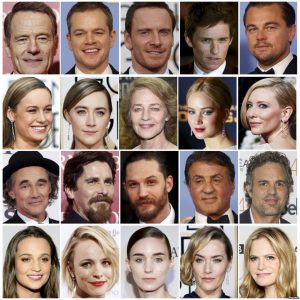
Introduction
The lack of diversity and rise in activism for the inclusivity of underrepresented minorities in Hollywood led to the popular support of the #OscarsSoWhite movement.[1b] Like many social movements that have a catalyst that draws attention to the subject matter, the #OscarsSoWhite movement was a compilation of decades worth of neglect and exclusion that finally erupted in 2015 for the 87th annual Academy Awards. Decades of forsaken reform and equality representation motivated people online to support the boycott of the Oscars by tweeting and tagging their posts with the #OscarsSoWhite hashtag. The steady and ongoing fight for equal praise in the entertainment industry mirrors on a smaller scale social movements like the Civil Rights, Black Lives Matter, and Occupy Wall Street initiatives. The changes expected to come out of these movements are not geared towards one entity or person but rather an established system that no longer fits the public’s standards. The fight for equality and diversification in the Academy Awards, entertainment industry, and all of Hollywood are in sync with many civil rights-based ideas that largely motivated people to support the movement.[2]
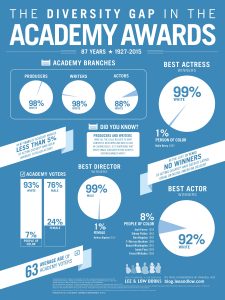
With the use of social media platforms like Twitter and Tumblr, #OscarsSoWhite was able to grow in popularity from its inception in 2015. The use of these social media platforms helped spread and attract attention to the movement, largely impacting the scale of its outreach. Twitter alone had the largest impact to inspire people to join the boycott and spread the discontent many shared with how the entertainment industry was being managed. Without social media support, this movement would have had great difficulty retaining its subsistence and existing as more than just another People magazine headliner.[4]
The inciting incident that gave way to #OscarsSoWhite was the proposed nominees for the 87th Oscars. The nominees chosen to represent the best entertainment 2014 had to offer fit a particular profile that matched 95% of the preceding nominees for nearly the last century.[5] The Academy’s primarily white-dominated atmosphere was again brought to light and the movement was born. However, the use and popularity of the movement peaked the following year when the Academy again released its nominees, who fell into the same profile as before. The nominees lay in stark contrast to the large pool of diverse entertainment members who were featured in or created many of the year’s box office or critically acclaimed hits. The outcry from the unrepresented parties showed the world how dominated entertainment is by the white community and the lack of variety in who they chose to praise.
Context
The Academy of Motion Picture Arts and Sciences formed in 1927 intending to recognize achievements in film as well as advance the art and science of motion pictures. The Academy is composed of 17 committees, which are lead by a Board of Governors.[6] Each committee covers one branch of The Academy, such as the actor branch, or cinematography branch. Throughout every year, members work to select new members, who are required to apply and obtain a letter of support from one of the members on the Board of Governors. They also review all eligible films throughout the year in preparation for voting when it comes closer to nomination time.
The first-ever Oscars Awards Ceremony was held in 1929 at the Hollywood Roosevelt Hotel. Now, an Oscar is the most prestigious award for anyone working in film. Throughout history, the topic of inclusion has always been at the forefront regarding the nominees and winners. Hattie McDaniel was the first African American to win an Oscar in 1940 for her role in Gone with the Wind. It took another 24 years for an African American to win again, which was Sidney Poiter. During all that time, only 14 African American Actors have ever won an Oscar and only 5 Latinx actors have won. It took 73 years for the first African American Actress to win the award for Best Actress, which was Halle Berry in 2002. As of 2019, she is the only African American woman to win for that category. Only 4 men have ever won for Best Actor as of 2019 as well.
There have only been a few instances in history when the Oscars faced serious public backlash. In 1996, the 68th Academy Awards were faced with the “Hollywood Blackout.” That year, only one person out of 166 Oscar nominees was black. While there was a massive public response, little was done after the awards ceremony to increase efforts of diversity and inclusion.[7]
Timeline
 The Academy of Motion Picture Arts and sciences announced the nominations for the 87th Academy Awards, honoring the films shown during the year of 2014.[8] For the first time since 1998, all 20 nominees for acting were white.[9] Following the announcement, April Reign coined the hashtag “Oscars So White” in her tweet, “#OscarsSoWhite they asked to touch my hair.” The hashtag caught on this year for the Oscars Ceremony, but it gained momentum during the next year’s Oscars Awards Ceremony.[10]
The Academy of Motion Picture Arts and sciences announced the nominations for the 87th Academy Awards, honoring the films shown during the year of 2014.[8] For the first time since 1998, all 20 nominees for acting were white.[9] Following the announcement, April Reign coined the hashtag “Oscars So White” in her tweet, “#OscarsSoWhite they asked to touch my hair.” The hashtag caught on this year for the Oscars Ceremony, but it gained momentum during the next year’s Oscars Awards Ceremony.[10]
The next year, the nominations were announced to celebrate the films of 2015. Straight Outta Compton and Creed, two of the largest hits of the year, were overlooked for any nominations of color. Only the two white writers of Straight Outta Compton were nominated, along with Sylvester Stallone in Creed. This left out all contributors of color to these two films when it came to Oscar nominations. Then for the second year in a row, all 20 acting nominees were white. In response to the nominations, #OscarsSoWhite began trending on twitter. Many celebrities showed support by tweeting using the hashtag and quickly after this the movement officially began.
After being snubbed for any nominations, Spike Lee announced he would be boycotting the Oscars. Jada Pinkett Smith joined the boycott as well, stating “Begging for acknowledgment, or even asking, diminishes dignity and diminishes power. And we are a dignified people. And we are powerful.”
Shortly after the responses to the announcement of nominations, the Academy released a statement regarding their efforts to change diversity within the members of the Academy.[11]The first goal they set was to double the amount of women in the Academy. The second was to double the number of diverse members and they aimed to achieve these goals by 2020.
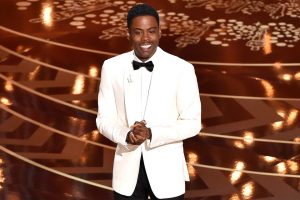
Chris Rock hosted the 88th Academy Awards Ceremony, despite pushback from his peers in Hollywood asking him to boycott the Oscars as well. Chris Rock cracked jokes for both sides of the movement, sparking controversy.[12]
928 new members were invited to join the Academy, bringing the total number of members up to 9,226. These invitations bring The Academy closer to its set goals by increasing the percentage of diverse members to 38% and raising the percentage of women up to 49%. Some of the invitees included Tiffany Haddish, David Kaluuya, Mindy Kaling, and Blake Lively.[13]
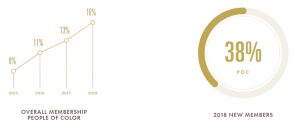
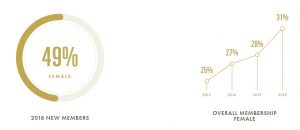
Key Actors
Managing editor of BroadwayBlack.com April Reign is credited with starting the hashtag in her tweet.[14] Although she created a tweet with the #OscarsSoWhite hashtag in January 2015 following the announcement of the 87th Oscar nominations, her tweet did not catch major attention until the next year. This was in part due to major industry players rallying behind the outcry on social media. On Martin Luther King, Jr. day in 2016, director Spike Lee posted on his Instagram that he would boycott the Oscars following the second consecutive year of people of color erasure from the nominations.[15] Around the same time on January 16, Jada Pinkett Smith wrote a tweet asking why people of color can entertain at the Oscars but not be recognized for their work.[16] Her tweet garnered over 13,000 likes and retweets and was one of the first public outings by a major celebrity to attack the nominations race that year. These initial criticisms aimed at the Oscars inspired many on-the-ground activists who were not major industry players to join the movement. On February 28, 2016, Rev. Al Sharpton led a live protest near Dolby Theater, where the Oscars were going to be held. [17] More than 100 protestors chanting to “put the Academy on notice” were joined by a collection of diversity-focused groups from Los Angeles, such as Project Islamic Hope, National Action Network, Los Angeles Urban League and Los Angeles Urban Policy Roundtable. [18] Because of their direct relationships with the film industry, several celebrity endorsers backed the movement. Although it is difficult to name all celebrity activists behind #OscarsSoWhite, the list contains a plethora of high-profile actors and figures such as Will Smith, Michael Moore, Mark Ruffalo, George Clooney, Reese Witherspoon, Don Cheadle, Lupita Nyong’o, Barack Obama, and Viola Davis.
Comedian Chris Rock played a mediating role as an African-American host for that year’s awards, with celebrities and media debating whether he should boycott his emcee role. He instead chose to confront the issue in his opening monologue at the 2016 Oscars, quipping on the potential loss of his emcee role by saying, “I thought about quitting. I thought about it real hard. But they’re not going to cancel the Oscars because I quit. And the last thing I need is to lose another job to Kevin Hart.”[19] A further point of contention was that at the time, the president of the Academy was Cheryl Boone Isaacs, the first African-American woman to be president. Despite stagnating diversity in her early years as President, from 2016 onward, she helped pushed a rapid change to academy membership. However, people questioned her role in suppressing talks of diversity changes until public outcry became larger. In 2017, she chose to step down from her role on the governor’s board of the Academy, relinquishing her chance for re-election as president. Concern over whether a new president will be as willing to tackle diversity changes has started since this news release.[20]
Because of Isaacs’ and Reginald Hudlin’s – African-American producer behind the Oscars – involvement, critics and allies were both quick to point out the Academy’s progress towards diversity using these executives as a proxy. For example, Gil Robertson, president of the African-American Film Critics Association, believed the movement behind the hashtag was being misled, responding that “it would be a mistake to boycott anything. The black community needs to understand that receiving an Oscar nomination is a big deal for anyone, regardless of race. Under Cheryl Boone Isaacs’s leadership, the Academy is moving closer to getting in step with the real world. Change takes time.”[21]
Demographics
While the movement covered a range of different minority groups, it was also noted that subgroups also emphasized their own goals. For example, when Chris Rock brought three Asian children on stage as a joke about hard-working accountants, several Asian American activists and celebrities were quick to point out that the move towards diversity should not be at the expense of individual groups fighting in the movement.[22]
While this kind of sub-division is often found across many horizontal movements like Occupy Wall Street, the #OscarsSoWhite movement is differentiated by the stratification of its main affected audience, who are well-paid celebrities and movie makers. This presents a layer of social status in the conversation, and whether class trumps status or vice versa.
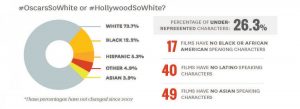
Social Media Presence
Alternative Hashtags
#BoycottOscars: Actress Jada Pinkett Smith and producer and filmmaker Spike Lee decided to take a stand against the lack of diversity in Hollywood by starting a boycott against the Oscars using this hashtag.
#WhitePrivilege: While conversations about the lack of inclusion of people of color were taking place, the issue of white privilege was at the forefront as the majority of white actors and actresses being preferred for nominations and awards was a direct reflection of that.
#50shadesofwhite: Dubbed from the popular Novel turned film ‘50 Shades of Grey’ this hashtag was used to stress the lack of inclusivity in the Academy as most of its nominated and most awarded actors and actresses were white.
#RepresentationMatters: This hashtag was used to further emphasize the need for equal representation of people from all backgrounds and ethnicities.
Most Important Posts on FB/Twitter
Actress Jada Pinkett Smith, being one of the main public figures to endorse the movement was vocal on why she took a stand against the Academy Awards by giving a breakdown of it on her Twitter and Facebook accounts.[24] April Reign, the creator of the movement also used Twitter as a platform to explain why she became vocal on the issue of lacking diversity in the industry.
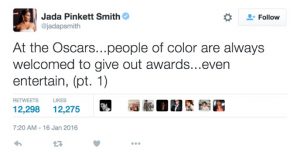
Memes vs Cause
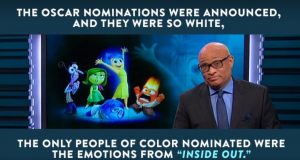
Here are some of the most relevant pictures and memes curated during the conversation. Some of the memes were in support of the movement and others were against the movement. These pictures highlight not only the lack of diversity but also other issues within the industry such as the stereotypical roles usually reserved for people of color etc.
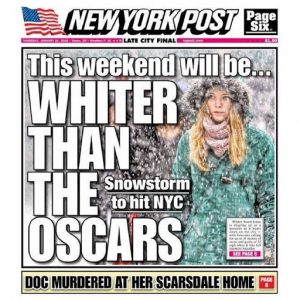
Importance of Social Media
Social Media has played a vital role in this movement by giving the topic a platform where it can be discussed. In an era where the world has become a global village connecting all of us regardless of location through different social media outlets such as Twitter, Instagram, and Facebook, a conversation such as this one has become easier to have as we all have a common space to exchange ideas. Social media is the primary reason this movement went as viral as it did. Conversations on the lack of inclusivity and diversity have been held long before this hashtag but the presence of social media has magnified it to what it is today. Social media has given a common platform where we can all pour our thoughts on issues collectively.
It’s sparked an important conversation on the lack of diversity within Hollywood and placed it on the forefront for the world to see. The whole world may not be in Hollywood to see and experience the issue firsthand, but if they’ve been active and following conversations on social media then they know what’s going on. As a result of the conversations held on social media on this topic a lot of pressure was and still is being placed on Hollywood Executives to incorporate change. A good example of this is, the voting class for the Academy Awards in 2016 becoming more diverse with the addition of actors and actresses of color being added. This made it the largest and most diverse voting class in Academy History.[27] The ratings of the Academy Awards in 2016 dropping by 6% after the hashtag went viral goes to show that the conversations surrounding these topics were taking effect and people were reacting to what was going on.
Organic vs. Planned Growth
The movement grew organically after April Reign, its creator decided to use her voice to bring to light the lack of diversity in the Academy Awards. Thereafter, she gained support on social media as people gradually began to join in the conversation. Planned growth came about after Jada P. Smith announced her boycott which led to more actors, actresses and public figures in the industry such as her husband Will Smith, Ava Duvernay, Ryan Coogler and Spike Lee joining her in boycotting the 2016 Academy Awards by not attending the ceremony.[28]
Offline Presence
Away from social media, this conversation is still ongoing within our homes, our classrooms and amongst ourselves. Social Media played its part in making us aware of the issue as much as possible but the conversation continues how best we can implement change. The effects of the offline presence have also been shown through the actions of people in the industry. The industry has worked to make crews more diverse as well as the movies and TV shows being made.[29]
The Black Lives Matter Movement is one of the movements that not only preceded but to a certain degree also influenced this movement. The Black Lives Matter movement was started in 2013 to demand justice for Trayvon Martin (a male of color) who was murdered by George Zimmerman who was later on acquitted. The movement was impactful and was used to highlight the struggles black people in the United States face in the arms of the law such as police brutality. Similarly, the Oscars so white movement was started to highlight the struggles of people of color within the industry who, for the longest time, were not and have not been given the same acknowledgment as their white peers. The Black Lives Matter movement, therefore, cleared the path in numerous ways for people of color to be able to vocalize their struggles and demand change through movements such as this one.
During the 1996 Academy Awards, there was a similar uprising against the exclusion of African Americans in the industry with the Hollywood Blackout movement. That year, only one out of 166 nominees were black. People magazine brought the movement to light by publicizing the event on the cover of their March 13th edition. This movement is likely what #OscarsSoWhite would’ve been without the use of social media platforms. The setting and components of both movements were similar in their cause, celebrity participation, and key actor involvement however without modern social media, meme culture, and the outreach the internet supplies, the Hollywood Blackout movement couldn’t get enough follower backing and attention which lead to the little impact it had on increasing inclusivity in the entertainment industry.
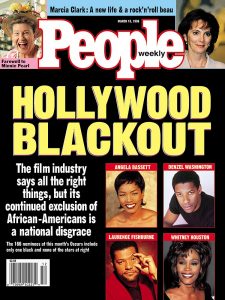
The most recent high-profile protest of the Oscars before #OscarsSoWhite was the 2007-8 Writers’ Strike, in which 12,000 screenwriters from film and television went on strike for 100 days to fight for increased compensation.[31] Writers unified under two American labor unions: the Writers Guild of America, East (WGAE) and the Writers Guild of America West. Scripted shows running at the end of 2007 were to be shut down, with ratings of major television networks plummeting during this period. Several entertainment awards shows, including the Oscars, were at risk of being canceled if waivers were not being pursued. The results were mixed. Writers lost $26 million in compensation during their time of protest, while gaining marginally in the expected payouts of their contracts. The aftermath showed the power of media conglomerates to stifle those traditionally on the sidelines of the film industry. Two key differences can be learned from this movement compared to #OscarsSoWhite. First, the presence of social media potentially could have lent these writers a powerful platform to voice their articulated thoughts while allowing frustrated TV and film viewers to express discontent with canceled viewings. Second, there was much less celebrification of this movement, with actors hesitating to stand in solidarity with the writers who were actively at odds with the higher compensation these stars were getting in comparison.
Impact of Movement
Prior to the 2016 Oscars, Academy membership was roughly comprised of 92% white voters and 75% male members.[32] We see a direct impact on how the #OscarsSoWhite has created change in this composition. Following the outcry, the Academy instated 41% voters of color and 46% female voters. This was fueled by Isaacs’s push for diversification efforts. Only two weeks after the nominations were announced, AMPAS set a goal to double both the number of women and diverse voters by 2020. Because these members set the nominations annually for the Oscars, an emergence of diverse films and actors being nominated or recognized followed suit. This list includes the movies Hidden Figures and Moonlight (which won Best Picture in 2017), with actors Viola Davis and Mahershala Ali winning in their respective acting categories, and Jordan Peele receiving a nomination for Best Director.
The wave of criticism trickled into casting decisions. Production giants Marvel and Disney committed to diversification efforts, hiring non-white actors in the traditionally white Star Wars series and hiring Ava Duvernay, an African-American female director, to head the production of A Wrinkle in Time. The financial successes of all-minority ensemble casts in movies like Black Panther and Crazy Rich Asians are sometimes attributed to the impact of the hashtag OscarsSoWhite. Film critic Ali Plumb explained “how ‘a complicated situation’ following campaigns like #OscarsSoWhite – which highlighted how white people dominated previous nominations – has amplified Black Panther’s cultural significance,” which not only allowed the movie to gross over 1 billion dollars at the global box office but also received Oscar nods in major categories like Best Picture.[33]
However, the reach of impact has been debated. Documentary nominations continue to be shortlisted based on the director’s identity at the Academy Awards, which favors dramatic arthouse productions or high-billing films.[34] Expanding into 2020, the Academy should not only reach its goals of member diversification but also reexamine the categories not highlighted in the initial public outcry over a white-dominated nomination field (actors, actresses, and directors).
Critiques of Movement
Criticism towards diversity efforts ranged several topics. First responders to the movement wanted to address the split between race and merit, arguing that the best performances that garnered nominations in 2016 happened to be by white performers. Academy member Penelope Ann Miller rebuked that “to imply that this is because all of [the Academy] are racists is extremely offensive. I don’t want to be lumped into a category of being a racist because I’m certainly not and because I support and benefit from the talent of black people in this business. It was just an incredibly competitive year.” [35] Miller added that, “ when you make race the issue, it can divide people even further, and that’s what I worry about.”
Additional criticism was aimed at the movement focusing on race as binary and as the single identity being supported. Heated discussions on the movement lacking a spotlight on Latinx, Asian, and LGBTQ performers came to a head when Chris Rock included a skit of young Asian children playing accountants at the 88th Oscars. His joke, which stereotyped the silent labor of Asian-Americans, provoked a backlash by reinforcing other minorities being excluded from the conversation about diversity. Actor Jeffrey Wright took to twitter to compare the universal efforts of the Civil Rights Movement to #OscarsSoWhite and Rock’s joke, noting that it was “Simple: Rosa Parks didn’t boycott for the right to throw other POC’s under the bus.”[36]
Conclusion
The movement is still very much alive and relevant to the political atmosphere of today’s world. Without the tools and reach online social platforms brought to this movement, the public awareness of this issue would have been limited to small blogs and articles that had little reach compared to Twitter, Tumblr, and other impactful outlets. The fight against racism, inequality, and lack of diverse representation is an ongoing issue around the world. Hashtags, tweets, and likes are great tools that can help in implementing impactful changes but they alone do not lead to a resolution. Social media presence has propelled #OscarsSoWhite a long way from where it started, but there’s still work to be done to ensure the changes being made now are not simply transitory gestures that will fade as time passes. Nevertheless, social media gave this movement the voice it needed to become globally accessible and make the changes it has and will continue to instill in the entertainment industry.
Author Biographies
Tory Bigelow
Since coming to UC Berkeley, she’s been planning on entering the business side of Hollywood when she graduates. Knowing the inequality in Hollywood, this movement allows for more inclusion and diversity within the industry. She’s excited to witness the changes within the industry as she enters it after graduating.
Armand Bogossian
As a senior at UC Berkeley studying Business Administration at the Haas School of Business, Armand took the Social Media and Social Movements course which helped him open his eyes to the different perspectives and possibilities around larger social issues. He hopes to use this new perspective he’s gained by applying it to his problem-solving skills.
Dallas Nguyen
Dallas is a fourth-year Business Administration student at the Haas School of Business. When he was younger, he frequented the Oscars YouTube channel, memorizing awards speeches and exploring the vast film industry through late-night Wikipedia marathons. He is excited to see the Academy evolve live alongside his own experiences and education.
Krystle Wangui
Krystle Wangui is a junior transfer student. She is also an intended Music and Theatre, Dance & Performance Studies Major. Social media in a lot of ways has not only been a source of entertainment for her but also an educative platform that has broadened her perspective on various things within the society. Being a woman of color who is passionate about the arts, this topic hits very close to home for her. She intends to implement change in every way possible, during her career, to elevate the struggles artists of color continuously face in the entertainment industry.
Sources
[1a] “#OscarsSoWhite, but These Industries Are Whiter.” Money, http://money.com/money/4238257/oscars-2016-industry-diversity/.
[1b] “Reel Inequality.” Google Books, books.google.com/books?hl=en&lr=&id=R5r3DQAAQBAJ&oi=fnd&pg=PP1&dq=inequality in hollywood&ots=k9IIel2snj&sig=zo0RBOlCF4mPcffA6Z461VyX_Oo#v=onepage&q=inequality in hollywood&f=false.
[2] Kaufman, James C., and Dean Keith Simonton. The Social Science of Cinema. Oxford University Press, 2014.
[3] Jalissa. “The Diversity Gap in the Academy Awards: Some Diversity Records Broken, But Still More Work to Do.” Lee & Low Blog, 7 June 2017, blog.leeandlow.com/2017/02/23/the-diversity-gap-in-the-academy-awards-diversity-records-broken/.
[4] “What’s Wrong with This Picture?” PEOPLE.com, people.com/archive/cover-story-whats-wrong-with-this-picture-vol-45-no-11/.
[5] Joanna. “#OscarsSoWhite: How I Learned To Stop Caring And Hate The Oscars.” @Cinefille, 11 Feb. 2016, cine-fille.com/2016/01/14/oscars-so-white-2016/.
[6] “About.” Oscars.org | Academy of Motion Picture Arts and Sciences, www.oscars.org/about.
[7] Breger, Esther. “The ‘Hollywood Blackout’ at the 1996 Academy Awards.” The New Republic, 29 Jan. 2016, newrepublic.com/article/128584/hollywood-blackout-1996-academy-awards.
[8] Sims, David. “The Oscars Haven’t Been This White in 17 Years.” The Atlantic, Atlantic Media Company, 29 Feb. 2016, www.theatlantic.com/entertainment/archive/2015/01/the-oscars-havent-been-this-white-in-17-years/384550/.
[9] “From Backlash To Boycotts: A Complete Timeline Of The 2016 Oscars Diversity Controversy.” ThinkProgress, thinkprogress.org/from-backlash-to-boycotts-a-complete-timeline-of-the-2016-oscars-diversity-controversy-3ad2745040b/.
[10] Ryan, Patrick. “#OscarsSoWhite Controversy: What You Need to Know.” USA Today, Gannett Satellite Information Network, 2 Feb. 2016, www.usatoday.com/story/life/movies/2016/02/02/oscars-academy-award-nominations-diversity/79645542/.
[11] Cieply, Michael. “Academy Board Endorses Changes to Increase Diversity in Oscar Nominees and Itself.” The New York Times, The New York Times, 22 Jan. 2016, www.nytimes.com/2016/01/23/business/media/oscars-diversity-academy-voting-rules.html.
[12] Miller, Julie, and Julie Miller. “How Chris Rock Addressed the #OscarsSoWhite Controversy in His Oscars Monologue.” HWD, Vanity Fair, 29 Feb. 2016, www.vanityfair.com/hollywood/2016/02/chris-rock-oscars-monologue-oscarssowhite.
[13] https://variety.com/2018/film/news/academy-new-members-2018-record-1202856702/
[14] Patrick, Ryan. “#OscarsSoWhite Controversy: What You Need to Know.” USA Today , 2 Feb. 2016, www.usatoday.com/story/life/movies/2016/02/02/oscars-academy-award-nominations-diversity/79645542/.
[15] Variety Staff. “Spike Lee, Jada Pinkett Smith Call for Oscar Boycott.” Variety , 18 Jan. 2016, variety.com/2016/film/awards/spike-lee-jada-pinkett-smith-oscar-boycott-1201682165/.
[16] Griggs , Brandon. “Jada Pinkett Smith, Spike Lee to Boycott Oscars Ceremony.” CNN Entertainment , 19 Jan. 2016, www.cnn.com/2016/01/18/entertainment/oscars-boycott-spike-lee-jada-pinkett-smith-feat/index.html.
[17] Hamedy, Saba. “What Supporters of #OscarsSoWhite Are Doing Instead of Watching the Awards Tonight.” Mashable , 28 Feb. 2018, mashable.com/2016/02/28/oscarssowhite-hollywood-protest/#2mTU_HyefZqZ.
[18] Hamedy, Saba. “What Supporters of #OscarsSoWhite Are Doing Instead of Watching the Awards Tonight.” Mashable , 28 Feb. 2018, mashable.com/2016/02/28/oscarssowhite-hollywood-protest/#2mTU_HyefZqZ.
[19] Griggs , Brandon. “Chris Rock: ‘You’re Damn Right Hollywood Is Racist’.” CNN Entertainment , 29 Feb. 2016, www.cnn.com/2016/02/28/entertainment/chris-rock-oscars-so-white-feat/index.html.
[20] Alistair, Bell. “Oscars Chief Boone Isaacs Steps down from Governors Board.” Reuters, Thomson Reuters, 13 May 2017, www.reuters.com/article/us-oscars-academy-booneisaacs/oscars-chief-boone-isaacs-steps-down-from-governors-board-idUSKBN188303.
[21] Variety Staff. “Spike Lee, Jada Pinkett Smith Call for Oscar Boycott.” Variety , 18 Jan. 2016, variety.com/2016/film/awards/spike-lee-jada-pinkett-smith-oscar-boycott-1201682165/.
[22] Ryzik, Melena. “Chris Rock’s Asian Joke at Oscars Provokes Backlash.” The New York Times, The New York Times, 21 Dec. 2017, www.nytimes.com/2016/03/01/movies/chris-rocks-asian-joke-at-oscars-provokes-backlash.html.
[23] “Diversity in Horror Matters, and Here’s Why.” Morbidly Beautiful, 29 Mar. 2019, http://morbidlybeautiful.com/diversity-horror-matters/.
[24] Ryan, Patrick. “#OscarsSoWhite Controversy: What You Need to Know.” USA Today, Gannett Satellite Information Network, 2 Feb. 2016, www.usatoday.com/story/life/movies/2016/02/02/oscars-academy-award-nominations-diversity/79645542/.
[25] We Must Stand in Our Power! www.facebook.com, https://www.facebook.com/watch/?v=10153983404106320.
[26] https://giphy.com/gifs/thenightlyshow-larry-wilmore-nightly-show-for-you-guys-Xav6Pp0ex5SLu
[27] Kilday, Gregg. “Film Academy Invites a Record 683 New Members: 46 Percent Female and 41 Percent People of Color.” The Hollywood Reporter, 30 June 2016, www.hollywoodreporter.com/news/oscars-academy-unveils-new-members-907361.
[28] Jack Shepherd @JackJShepherd. “Here’s Everyone Who Boycotted the Oscars and Why.” The Independent, Independent Digital News and Media, 29 Feb. 2016, www.independent.co.uk/arts-entertainment/films/news/oscars-2016-everyone-boycotting-the-academy-awards-and-why-from-jada-pinkett-smith-to-spike-lee-a6902121.html.
[29] Ramos, Dino-Ray. “Film & TV Diversity: What Changed In 2019 And What’s Next In 2020.” Deadline, 4 Jan. 2020, deadline.com/2020/01/hollywood-diversity-2009-strides-film-tv-representation-inclusion-1202817299/.
[30] Kilday, Gregg. “Film Academy Invites a Record 683 New Members: 46 Percent Female and 41 Percent People of Color.” The Hollywood Reporter, 30 June 2016, www.hollywoodreporter.com/news/oscars-academy-unveils-new-members-907361.
[31] Blickley, Leigh. “10 Years Later, Here’s How The Writers Strike Indelibly Changed TV.” HuffPost, HuffPost, 12 Feb. 2018, www.huffpost.com/entry/10-years-ago-screenwriters-went-on-strike-and-changed-television-forever_n_5a7b3544e4b08dfc92ff2b32.
[32] “What’s Wrong with This Picture?” PEOPLE.com, people.com/archive/cover-story-whats-wrong-with-this-picture-vol-45-no-11/.
[33] Blake, Jimmy. “Oscars 2019: Why Black Panther Win Would Be a ‘Big Surprise’.” BBC News, BBC, 23 Jan. 2019, www.bbc.com/news/newsbeat-46972480.
[34] “Mass Communication and Society.” Taylor and Francis Online, 29 Nov. 2017, www.tandfonline.com/doi/pdf/10.1080/15205436.2017.1409356?needAccess=true.
[35] Feinberg, Scott. “Academy Members Defend Their Oscar Votes: ‘To Imply We Are Racists Is Extremely Offensive.’” The Hollywood Reporter, 30 Apr. 2019, www.hollywoodreporter.com/race/oscarssowhite-academy-members-defend-oscar-857416.
[36] Abad-Santos, Alex. “What Chris Rock’s Lazy Asian Joke Revealed about ‘Diversity’ in Hollywood.” Vox, Vox, 1 Mar. 2016, www.vox.com/2016/3/1/11142390/chris-rock-asian-joke-oscars.
